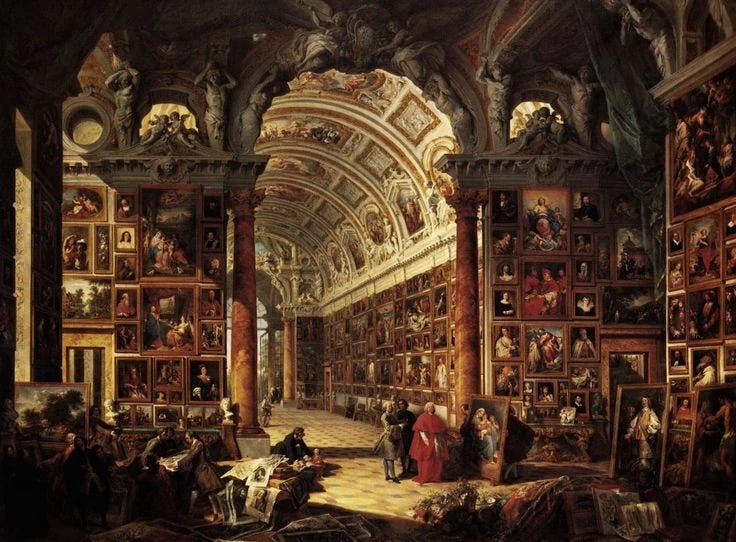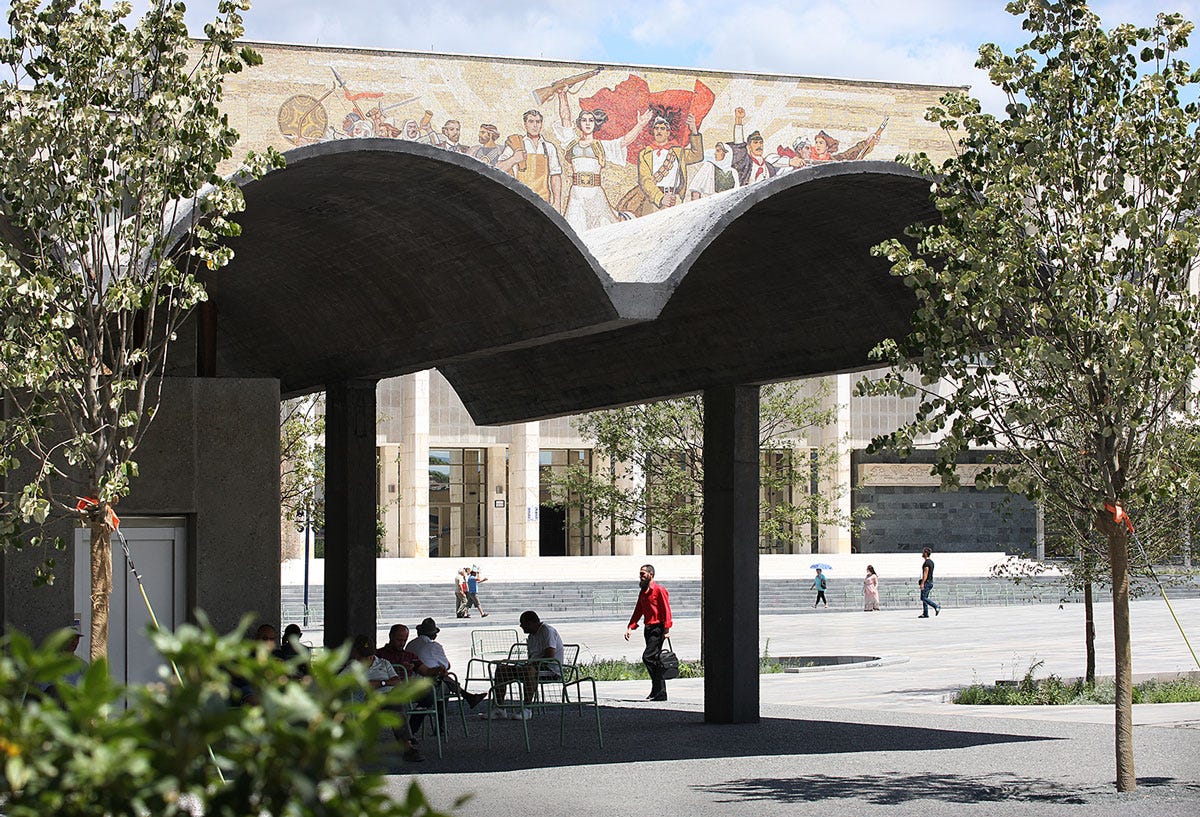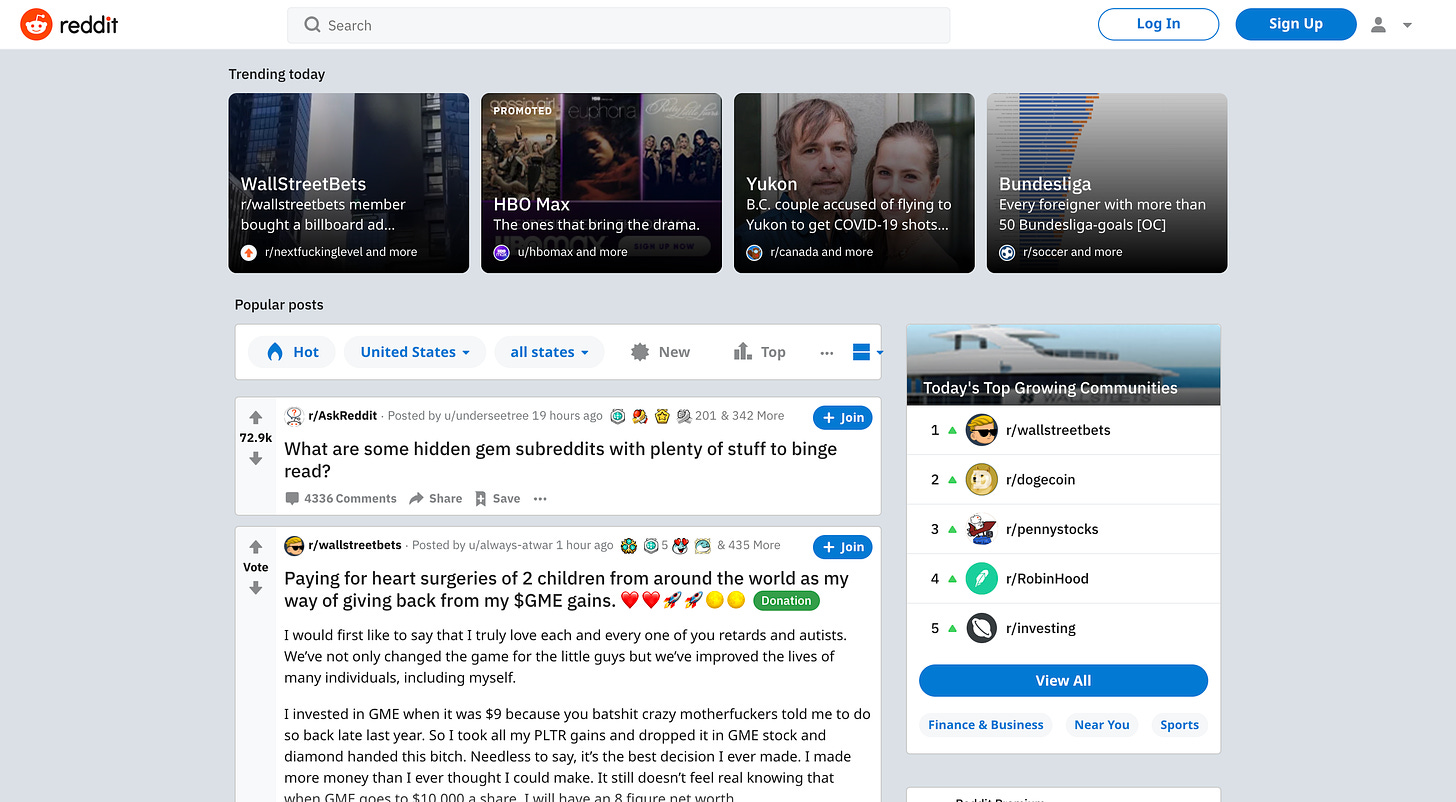Hi friends,
I hope you missed the resources! I took some extra time to source this month’s digest - it’s more focused and gathered than my previous two. There are also some interesting miscellaneous reads at the end — I especially thought the piece about male masculinity and emotional weakness was especially important for my male readers. Enjoy!
Intro
“What does a public square (or park) look like online?”


This question has been on my mind for the last two months. It’s so broad that my mind has a hard time thinking up any sort of solution. What does a public space online look like? I believe public spaces online are mission critical for humanity moving forward (I’ll discuss this some more below) but I didn’t understand how public spaces existed online right now - if at all.
At first I thought quasi-anonymous social media networks (like Reddit) must be close. While such services may be spaces for the public, they aren’t by the public. Nor is anonymity important (I think it’s interesting that my mind even jolted there in the first place) - parks aren’t anonymous. As I began reading about the history of organizing online, I began to understand that there have been distinct chapters in the internet’s evolution that can be marked by how people congregate. Initially, the open-source internet was for those who knew and could afford to connect. Eventually, corporations could offer competitive advantage to users by going vertical (beginning with AOL), which is where we still find ourselves today. I’m sure many of you are familiar with the term ‘walled garden.’ The internet is filled with numerous walled gardens that are forced to interact with each other because of consumer pressure, which is ever increasing.
Although many parts of the internet are islands, we still find public space online, especially through the form of shared media and culture. As Drew Austin puts it: “In this time of widespread physical isolation, viral events like Tiger King or the Bernie Sanders meme function as proxies for public space: the experiences we can all collectively share and inhabit.” Most internet-beings can demarcate our last 9 months by chapters as well, manifested online through ‘chapters of quarantine’ memes. We’ve even seen AOC live-stream a virtual town hall on Twitch about the GME crisis. What would this look like if we could truly have a public square online, instead of our current fragmented reality of sending a tweet over a few messaging services, or sharing a post through Instagram DMs. Do not think I mean a live AR/VR experience - I truly believe there is pressure for a simple shared entity in a simple web format. (I do not explain why I believe public spaces are so important, or even worth bringing online, in this piece. Let me know if that would be helpful to discuss in a future release.)
Some believe that this pressure is reaching a boiling point that will create ‘Internet 3.0’ in the next few years, using Etherium as a major building block. Some sources that discuss what a new internet built for humanity can look like:
Resources
Simon Sarris, That Which is Good, Breaks.
“That which is unique, breaks. It must be cultivated. It is one thing to care for a magnificent garden, but another entirely to plan for a new one.”
“Something worrisome: The more things become commodities, the more we start to treat places and people like commodities, too. But I am an optimist, I think we are only in the early hours of understanding the techniques we have created. Technology is a wild horse, we have learned to harness it, but not master it. The results run amok: Our new creations trample the beauty of places and things because we have yet to incorporate our love of craft. And so this initial commodification comes to us at the expense of all things divine, and it causes the sacred to leave art, as it leaves things and places too. But we avoid the ugly park and travel to the beautiful park. The divine is still within people, and will not leave.”
(Tangentially, On Familiarity and Belonging, also by Sarris.)
Environments that raise aspirations
“how can we redesign the incentive system so that our actions indirectly take good care of the planet?” —> “by broadening people's awareness of the consequences of their self interest and other forms of interests —Em”
Plato’s Allegory of the Cave applied to the internet, in Internet Atlas by Louise Drulhe
“In Plato’s ‘Allegory of the Cavern’, a group of people watch a projection of shadows on a wall and think this is reality. The Internet we use is actually a projection of itself through the prism of locality. Internet is a single entity, but with a myriad of territorial projections.”
Logic Magazine’s 12th Issue: Commons (PDF download - lmk if you can’t I’ll share it with you)
Lot’s of good stuff in here, all sorts of ‘commons’ that manifest themselves online. There’s a great piece about the future of the internet and work culture and how it relates to identity at Amazon.
Museums and public benches as common good, first by Douglas Rushkoff and then Marina Garcia-Vasquez
“What struck me about her observation was that it was correct. Most public spaces have some utility value — such as educating kids for the workforce, or providing research materials for local scholars, or social services for the poor. The museum has no excuse other than enrichment. And if the museum is the public sector’s way of showing off, so much the better. It’s simply demonstrating that public innovation can transcend purpose, and reach for the sublime.”
“The public park bench is wondrous in all of its manifestations. Since the 14th century, outdoor public seating in Florence conveyed a sense of civic action and enabled public spaces to turn into theatrical performances and garner tribunal purposes. Yet it wasn’t until the mid-19th century in Paris that park benches were politicized to mark the great era of urbanity. Designed by Gabriel Davioud in the 1850s, public benches were dispersed across the city in newly opened public gardens and boulevards. … You are in communion with society just sitting on a park bench. Most notably you can enjoy a city without having to consume, you can be welcomed into a space without having to engage with strangers.
Misc. Reads
^ Parks and libraries helped save lives during a Chicago heat wave bc if someone was missing from their local hangout, a friend would go check on them. Parks build community.
^ How about Vienna’s social housing?!?!
Men and women as crutches, and the need for masculine intimacy. Men Have No Friends and Woman Bear the Burden in the Atlantic. Thankful for my comitiva :).
That’s all for this release! Please comment your reactions below —> what should a public park look like online? xoxo




